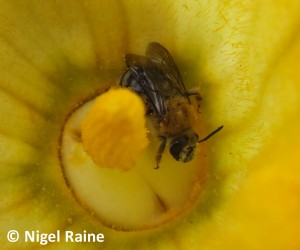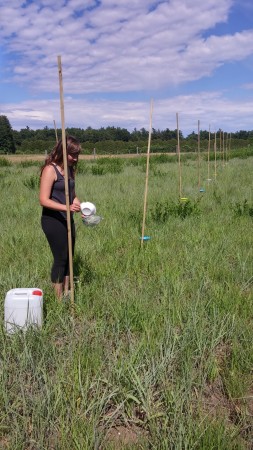
Pollinators do a lot for us – from pollinating our fruits and vegetables to teaching us about nature and our impacts on the environment, says University of Guelph professor Nigel Raine.
Against the backdrop of global pollinator declines, National Pollinator Week, June 20-26, is the ideal time to draw attention to the importance of pollinators for both producing food and maintaining wild flower communities, and enhancing the resources needed by pollinators, he said.
“We need to raise awareness about pollinator declines, probably caused by multiple interacting factors, and what can be done to provide the flowers and nest sites they need to thrive,” said Raine, an internationally recognized expert in pollinator ecology and conservation.
Raine studies how the behaviour and ecology of pollinators can be affected by environmental stress factors, such as pesticide exposure. He holds the Rebanks Family Chair in Pollinator Conservation — one of three chairs at U of G supporting conservation knowledge and practice for beneficial insects.

“Although one in three mouthfuls of food we eat depends on the pollination services of wild bees, very little is currently known about the status of these essential pollinators in many parts of the world, including Canada,” Raine said.
He and his team at Guelph are monitoring wild pollinator populations at more than 50 sites across Ontario. The study covers a wide range of habitats, from provincial parks and conservation areas to farms and wetlands, urban gardens and remediated sites.
“Historically we have taken the ‘free’ services provided by wild pollinators somewhat for granted – struggling pollinator populations will be reflected by reduced crop yield and quality,” Raine said.
“We urgently need to get a clear idea of what wild pollinator health and biodiversity looks like across the province and how it might change in the future. Widespread, long-term pollinator monitoring will provide this critical information.”
Working with various organizations, landowners and “enthusiastic citizen scientist” volunteers, Raine is sampling insect pollinators using colourful pan traps. These samples will be labelled, catalogued and identified.
“We’re looking at what pollinator species are found in different habitats across Ontario, and how these patterns change during the spring and summer. Will these patterns of pollinator diversity change over time, and can we measure positive impacts in response to implementation of conservation strategies?” said Raine.
“Our results will provide policy-makers and landowners with tools and information to make evidence-based decisions about pollinator conservation, land use and management.”